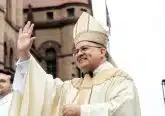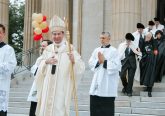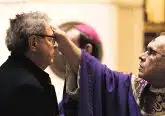“Thou Art A Priest Forever” Priestly Ordination and Ontological Change
In 1964, English novelist Evelyn Waugh described how the simple liturgy of the Mass (the “low Mass” in pre-Vatican II parlance) was instrumental in his conversion to the Catholic faith. He explained that he “was not at all attracted by the splendour of her great ceremonies—which the Protestants could well counterfeit.” Disconnected from the Mass, splendid liturgy is an empty gesture. Rather, for Waugh, the beauty of the Mass was displayed by the unique task that only the Catholic priest has the ability to perform. Waugh was drawn to the Church by the priest as “a craftsmen,” he continued: “A man with a job which he alone was qualified to do,” making Christ present on the altar. Waugh’s point is that high liturgical form, while not unimportant, is secondary to the essential mystery of the priest as “in persona Christi,” transforming the simple elements of bread and wine into the glorious presence of Christ.
The priest alone is qualified to effect this mystery because his ordination causes what theologians call an “ontological” change. This is a fancy way of saying that the “being” of the priest after his ordination is substantially different from his “being” before his ordination. In some ineffable sense, he becomes a different person: set apart with the unique ability to celebrate the summit of our faith, the mystery of the Eucharist. In May 2023, 13 men who have been formed and educated at Mount St. Mary’s Seminary & School of Theology (MTSM) will join this band of craftsmen; seven for the Archdiocese of Cincinnati and six for other dioceses who send their men to MTSM for education and formation. Having had a part in teaching these men, I can confidently say they are prepared to fulfill this role, despite the many difficulties they will face. All Catholic priests are confronted by perennial challenges.
Aside from never really being “off the clock,” they are asked to bear the moral and spiritual burdens of the flock they shepherd, whether in a traditional parish or some specialized ministry, such as a hospital or military chaplain. In addition to these, every generation of newly ordained priests faces challenges that are particular to the time of their ordination. The men in recent cohorts still labor in the wake of the past several years’ sexual scandals, which damaged both the priests’ morale and the flock’s trust. Of course, it is unjust that these men are yoked with that legacy. To their credit, they still answered the call to assume the burden.
Additionally, new pastoral challenges confront our young priests, who will be assigned to parish families, and most will be required to travel many miles and learn the personalities of several churches. This exhausting trend shows no signs of reversing. The number of new ordinations in the Archdiocese of Cincinnati are encouraging, but they are not yet outpacing retirements.
Cultural and social changes, many of which crept into the Church, will also challenge these new priests’ skill and patience. Questions about traditional understandings of gender and sexuality, for example, will have to be answered. I admonished them not to sacrifice doctrinal integrity on the altar of pastoral sensitivity. This is no small feat; it is easier for me to say than for them to practice. While the Church’s teaching is clear on many moral matters, ambiguities abound in those teachings’ application to particular situations. The best formation can give them the skills to negotiate these challenges lovingly and prudentially, but it cannot predict every turn or hazard in the road.
All of which is to say, these courageous men need our prayers and support. Their ordinations will give them the unique ability to stand in the person of Christ on the altar and administer the Church’s sacraments. But it will not make them immune to the frailties that accompany all of us in our moral and spiritual lives, including illness, stress, exhaustion and even, from time to time, failure. It is up to us, who they selflessly choose to serve, to reciprocate their bold decision to follow Christ’s call to minister to us. We can do this in various ways: invite them into our homes for a meal, take them out for a beer or cup of coffee, treat them to a ball game, play, or concert. And, of course, this applies to all our priests, from the well-tested veterans to the newly ordained.
When they are ordained, priests become “priests forever.” That change effected in them is indelible and permanent. They receive it for the purpose of bringing the simple beauty of the Mass to us. May we show them the appropriate expressions of gratitude and affection for their willingness to make Christ present for us on the altar, a job that they alone are qualified to do.
 Dr. Kenneth Craycraft is an attorney and the James J. Gardner Family Chair of Moral Theology at Mount St. Mary’s Seminary & School of Theology.
Dr. Kenneth Craycraft is an attorney and the James J. Gardner Family Chair of Moral Theology at Mount St. Mary’s Seminary & School of Theology.
This article appeared in the May 2023 edition of The Catholic Telegraph Magazine. For your complimentary subscription, click here.













